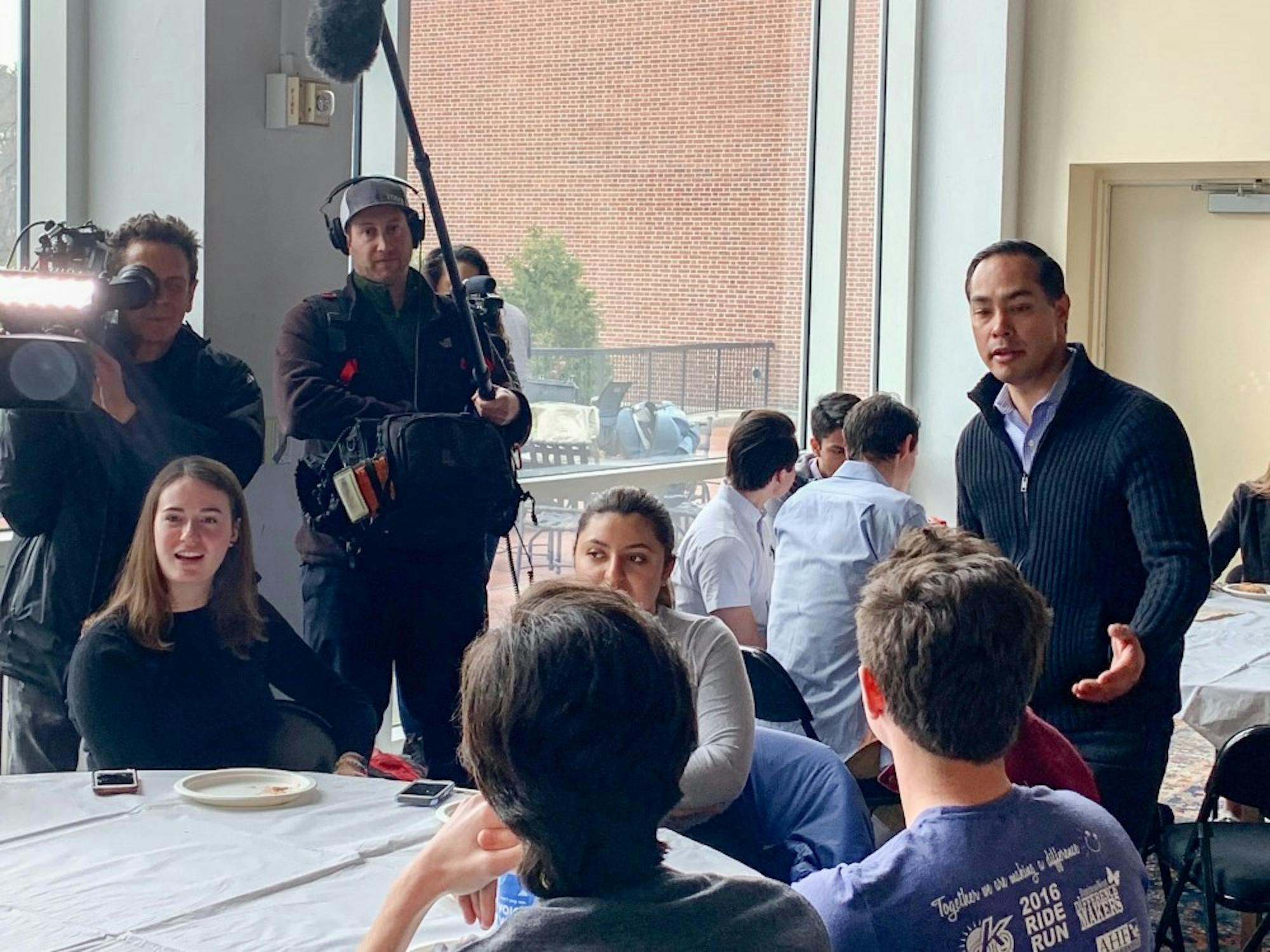Former U.S. Secretary of Housing and Urban Development and Democratic presidential candidate Julian Castro visited campus Sunday afternoon to have lunch with about 30 students in the Faculty Lounge of the Hopkins Center for the Arts and kick off the New Hampshire College Democrats Convention. Speaking to students about his policies and taking questions from students, Castro discussed topics ranging from the current tax code to climate change.
The most recent polling for the 2020 Democratic primary from Morning Consult shows Castro with just one percent support nationwide, and polling for the New Hampshire primary from the University of New Hampshire does not pick up Castro.
“With so many Democratic candidates being in the race, I want to know what separates them,” said Ndalaku Okolo ’22, who was present at the lunch.
Castro opened the lunch, attended by both Dartmouth students and Saint Anselm College students, by thanking the students in attendance for their commitment to bettering their community and state.
“In 2020, it looks like people are stepping up, and you’ll have another chance to make big strides,” Castro told the audience.
Castro detailed several parts of his platform before visiting each table of students and taking questions. Castro said his priorities included creating “a 21st-century safety net,” addressing climate change and reforming the tax code. His safety net proposal includes universal healthcare, universal pre-kindergarten, an improved public education system, a system to relieve student loan debt and instituting free tuition at public universities and community colleges. He emphasized that he understood how student loan debt affects individuals, saying that he had $81,000 in student loan debt after law school.
“We need to make it so people can go further, no matter how much money they have,” Castro said.
Addressing the issue of climate change — one of his priorities in the campaign — Castro said that his first executive order, if he were to be elected, would be recommitting the United States to the Paris Agreement — a 2016 accord signed by 195 countries calling for a reduction in global pollution — and rededicating the country to reducing carbon emissions and using reusable energy.
Castro also addressed the current federal tax code by saying the U.S. needs a new policy that “rewards work instead of wealth.” Citing that Amazon grossed $11 billion in the last fiscal year but did not pay any federal income tax, Castro said that the current system reflects “priorities that are wrong.”
Castro took several questions from students after he discussed his policies.
In response to a question about immigration reform, Castro said he would end family detention, decriminalize crossing the border and create a pathway to citizenship for all undocumented immigrants — as long as the individuals had not committed a serious crime in the United States. Castro also said he would work with Central America to make the region a safer place with greater opportunity, which he said would eliminate many peoples’ need to come to the U.S. He also said that he would institute a program similar to the Marshall Plan, which Castro said would be mutually beneficial to the United States and the targeted Central American countries. The Marshall Plan, otherwise known as the European Recovery Program, was a U.S. program that gave economic assistance to western Europe in the aftermath of World War II.
Responding to a question about how he plans to curtail the opioid epidemic, Castro said he hopes to enact prevention policies as well as provide the affected communities with the appropriate treatment resources.
“I want to ensure we’re the smartest, healthiest, fairest and most prosperous nation on Earth,” Castro said. He also said that he would address “environmental racism,” such as the water crisis in Flint, MI.
Castro also said he plans to crack down on human and drug trafficking coming through legal points of entry into the United States as well as to legalize marijuana.
Vanessa Soncco ’19, who questioned Castro on his immigration policy, believed Castro’s answer was “standard” for a Democratic candidate. However, she added that once politicians actually gain the positions of power for which they campaign, they more often than not are unable to make the goals they ran on become reality.
Answering a few questions posed by The Dartmouth, Castro discussed worries about the next generation of Americans, voting rights and American exceptionalism.
When asked about the concern that the next generation of Americans would be worse of than their parents, Castro referred to his plan for a new safety net as the answer to their worries. He also affirmed the concept of American exceptionalism.
“I want us to lead in human rights, and I think we have a lot to be proud of when we think about that issue,” Castro said. “We’ve also made a lot of mistakes, but we have a leadership role to play to ensure human rights and democracy are preserved around the world.”
On the issue of voting rights in New Hampshire, Castro said that if elected, he would do “everything” to stop legislation such as the recent law passed in New Hampshire that bars most out-of-state college students from voting in the state. Castro also said he would appoint individuals to the Department of Justice and judicial positions who fully support the Voting Rights Act.
Yliana Beck ’22, who is from Castro’s hometown of San Antonio and lived there when Castro served as a city councilman and mayor, expressed concern that the Latino voters would split between Castro and fellow Democratic presidential candidate and former Texas Congressman Beto O’Rourke.
After Castro’s introductory remarks at the convention, he invited all students to apply for internships on his campaign.
“I’m happy to see how seriously you all take this process,” Castro said. “There’s a power in your youth and a power in wanting to serve your community that people will look favorably upon.”


